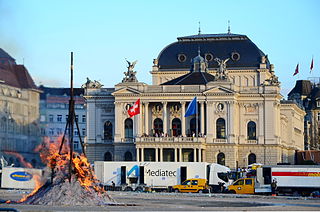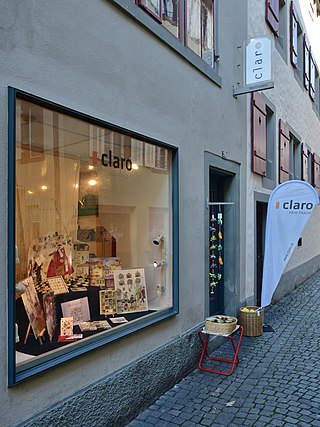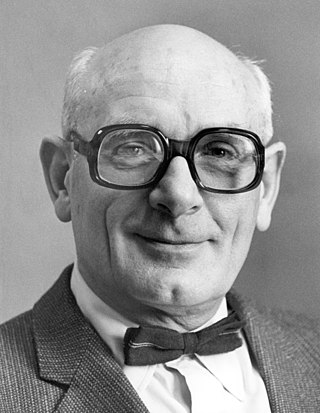
Davos is an Alpine resort town and a municipality in the Prättigau/Davos Region in the canton of Graubünden, Switzerland. It has a permanent population of 10,832 (2020). Davos is located on the river Landwasser, in the Rhaetian Alps, between the Plessur and Albula Ranges.

The World Economic Forum (WEF) is an international non-governmental organization for public - private sector collaboration based in Cologny, Canton of Geneva, Switzerland. It was founded on 24 January 1971 by German engineer Klaus Schwab. The foundation, which is mostly funded by its 1,000 member companies – typically global enterprises with more than US$5 billion in turnover – as well as public subsidies, views its own mission as "improving the state of the world by engaging business, political, academic, and other leaders of society to shape global, regional, and industry agendas".

Paul Grüninger was a Swiss police commander in St. Gallen. He was recognized as one of the Righteous Among the Nations by the Yad Vashem Holocaust memorial foundation in 1971. Following the Austrian Anschluss, Grüninger saved about 3,600 Jewish refugees by backdating their visas and falsifying other documents to indicate that they had entered Switzerland at a time when legal entry of refugees was still possible. He was dismissed from the police force, convicted of official misconduct, and fined 300 Swiss francs. He received no pension and died in poverty in 1972.

Orpund is a municipality in the Biel/Bienne administrative district in the canton of Bern in Switzerland.
The Public Eye on Davos, held every year between 2000 and 2015, was a counter-event to the annual meeting of the World Economic Forum in Davos.

Pedro Lenz is a Swiss writer.

10vor10 is a current affairs programme broadcast at 21.50 every Monday to Friday evening on the German-language Swiss public television channel SRF 1.
WOZ Die Wochenzeitung,, is a Swiss, German-language weekly newspaper published in Zürich.
Rotpunktverlag is a Swiss publishing house, headquartered at Hohlstrasse 86A, 8004 Zürich, Switzerland. Founded in 1976 in Zürich, it is specialized in political history.

Das Hilfswerk für die Kinder der Landstrasse, more commonly known as Kinder der Landstrasse, was a project implemented by the Swiss foundation Pro Juventute from 1926 to 1973. The project aimed to assimilate the itinerant Yenish people in Switzerland by forcibly removing their children from their parents and placing them in orphanages or foster homes. Approximately 590 children were affected by this program.
The Swiss children coercion reparation initiative was a Swiss federal popular initiative to change the federal constitution, which was launched in April 2014.

Child labour in Switzerland was a fact in rural areas to the 1960s, at least tolerated by the Swiss authorities referring to the so-called Verdingkinder, as up to 100,000 children were needed as cheap workers mostly on farms the decades before.

Otto F. Walter was a Swiss publisher, author and novelist, which is well known in the German language countries. Otto Friedrich Walter was the younger brother of Silja Walter, a Benedictine nun in the Fahr Abbey and also a popular writer.

Alternative Bank Switzerland (ABS) is a sustainability-oriented bank based in Olten, Canton of Solothurn, in Switzerland.

Opernhauskrawalle is the Swiss German term generally used for the youth protests at the end of May 1980 in the Swiss city of Zürich, a municipality in the Canton of Zürich. Also called Züri brännt, these events marked the 'rebirth' of the alternative youth movement in Switzerland in the 1980s.

claro fair trade, commonly shortened to claro and written in minuscules, is a sustainability-oriented retail company based in Orpund, Biel/Bienne administrative district, in the Swiss Canton of Bern. claro was initiated by Erklärung von Bern, a sustainability-oriented independent solidarity development in Switzerland, in 1977.

Chantal Galladé is a Swiss politician, represented the Canton of Zürich in the Swiss National Council as member of the Social Democratic Party of Switzerland (SP) from December 2003 until December 2018.
Susan Boos is a Swiss journalist and publicist. Since 2005, she is the editor-in-chief of WOZ Die Wochenzeitung. Since 2021 she has been the president of the Swiss Press Council.

Peter Sager was a Swiss political scientist and economist, an expert in Eastern European affairs, as well as a right-leaning conservative and later libertarian politician. He was the founder and former head of the Swiss Library of Eastern Europe and the Swiss Eastern Institute. His political views and anti-communist publications and lectures made him one of the most controversial figures in Switzerland after World War II.
Elisabeth Joris is a Swiss historian.

















